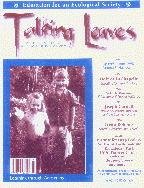

The understanding that we are a part of something larger than ourselves, is, I feel, Nature's greatest gift. With it, one's sense of identity expands and, by extension, so does his or her concern for the well being of all. True caring for the environment comes, as Lao Tsu said, "when you love the world as your own self." Whenever we, as nature leaders, point out a bird or flower, aren't we ultimately hoping to encourage this type of loving respect?
In Western culture, especially, people often confuse knowledge with wisdom, and think that if we learn enough, then we'll care enough. But knowing what we ought to do, and doing it are two different things. Tanaka Shozo, the pioneering Japanese conservationist, said, "The care of rivers is not a question of rivers, but of the human heart." For love is the greatest stimulant to the will.
Of course a balance of reason and feeling is needed for understanding nature. The forte of science is explaining how nature works so we can, for example, restore damaged ecosystems and understand the consequences of certain types of behavior. Science is very practical and helps us work creatively with nature.
While science explains nature to us, it is only our intuition, or calm feeling, that can perceive it. When Albert Einstein discovered the law of relativity, it was in a flash of intuitive insight. Only many years later was he able to reason it out scientifically. Einstein said also that every scientist, to be great, must have a mystical awe of the universe. In other words, be someone of deep feeling and reverence. Science, if it is to be more than mundane, needs to be accompanied by and inspired by deep intuitive feeling. Intuition has been described as the knowledge of the soul because through it, we experience our unity and harmony with the totality of life.
Practically speaking, to achieve this lofty goal, I've developed and use a simple, yet subtle and powerful system of teaching based on universal principles of awareness and how people learn. The system is called Flow Learning(TM). Its goal is to give students intuitive as well as an intellectual understanding. Flow learning also is very adaptable and can be used to teach any subject matter. It has four stages: Awaken Enthusiasm, Focus Attention, Direct Experience, and Share Inspiration:
1. Awaken Enthusiasm--Children learn if the subject matter is meaningful, useful, fun, or in some way engages their emotions. Time spent in creating an atmosphere of curiosity, amusement, or personal interest is invaluable because once students' enthusiasm is engaged, their energy can be focused on the upcoming lesson or experience.
2. Focus Attention--Some students' minds can be compared to a team of wild horses running out of control. Without concentration no true learning can take place. The activities in this stage challenge the players in fun and creative ways. To successfully meet these "challenges" the players have to concentrate on one of their physical senses. In doing so, they become more calm, focused and observant of their surroundings.
3. Direct Experience--Once students' interest and energy is awakened and focused, the stage is set for deeply experiencing nature. These absorbing, experiential activities have a dramatic impact that involves people directly with nature. These games help us discover a deep, inner sense of belonging and understanding. If people are to develop a love and concern for the earth, they need these direct experiences; otherwise, their knowing remains remote and theoretical and never touches them deeply.
4. Share Inspiration--This stage provides an interesting way for students to reflect together on what they have learned. In our fast-paced world, students and teachers alike often rush from one activity to another. Yet taking the time to reflect upon an experience can strengthen and deepen that experience. It need not take long. It can be as simple as responding to a few questions, writing a journal entry, or drawing a picture. Goethe said, "A joy shared is a joy doubled." Giving students the opportunity to share their experience increases the learning for the entire class. Sharing also brings everyone together and creates an uplifting atmosphere, making it much easier for the teacher to share inspirational stories and ideas.
Flow Learning makes inspirational teaching very realistic, because it works with people where they are, and step by step, gently brings them to a deeper, more profound experience of nature. For example, the first stage of Flow Learning--Awaken Enthusiasm--uses playful games to get the children excited and motivated to learn. A stationary car is hard to steer, but once it's moving, it's quite easy to guide the car where you want it to go. It is the same for children or adults: once you get them enthusiastic, it's easier to guide them. The Flow Learning progression leads naturally to its later stages and the intuitive realization of our connection to everything around us.
Man is not himself only...Joseph Cornell is the author of Sharing Nature with Children, Sharing the Joy of Nature, Listening to Nature, and Journey to the Heart of Nature, and founder of Sharing Nature Foundation.
He is all that he sees;
all that flows to him from a
thousand sources...
He is the land, the life of its
mountain lines, the
reach of its valleys.-Mary Austin
�1998 Talking Leaves
Spring/Summer 1998
Volume 8, Number 1
Education for an Ecological Society
We welcome your letters!
For a sample copy of the Spring/Summer 1998 issue, "Education for an Ecological Society," send $6 to
